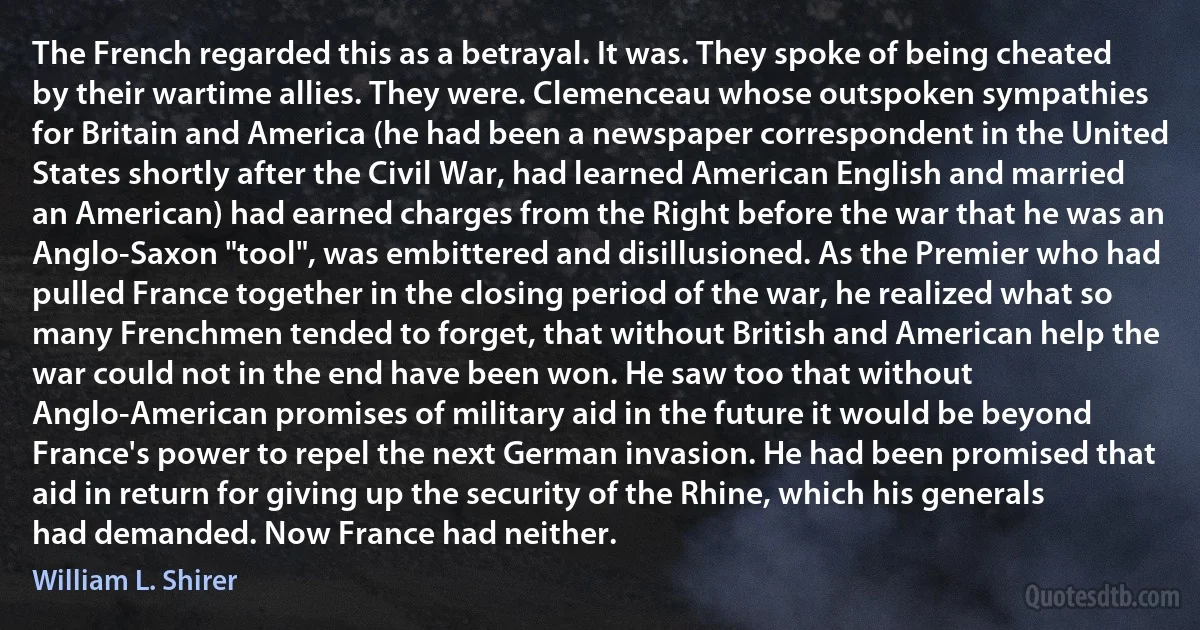William L. Shirer quotes
In our new age of terrifying, lethal gadgets, which supplanted so swiftly the old one, the first great aggressive war, if it should come, will be launched by suicidal little madmen pressing an electronic button. Such a war will not last long and none will ever follow it. There will be no conquerors and no conquests, but only the charred bones of the dead on and uninhabited planet.

William L. Shirer
Chamberlain's stubborn, fanatical insistence on giving Hitler what he wanted, his trips to Berchtesgaden and Godesberg and finally the fateful journey to Munich rescued Hitler from his limb and strengthened his position in Europe, in Germany, in the Army, beyond anything that could have been imagined a few weeks before. It also added immeasurably to the power of the Third Reich vis-à-vis the Western democracies and the Soviet Union.

William L. Shirer
Though brutal and bombastic, and dripping with venom against the Czech state and especially against the Czech President, the Fuehrer's speech, made to a delirious mass of Nazi fanatics gathered in the huge stadium on the last night of the party rally, was not a declaration of war. He reserved his decision -- publicly at least, for, as we know from the captured German documents, he had already set October 1 for the attack across the Czech frontier. He simply demanded that the Czech government give "justice" to the Sudeten Germans. If it didn't, Germany would have to see to it that it did.

William L. Shirer
There was much idle talk at the Conference of Paris about the disappearance of four mighty empires, German, Russian, Austro-Hungarian, and Turkish. But the cynical Clemenceau, at the head of the French delegation knew that the strongest of them remained -- even though it had reluctantly become a Republic. His task at the peace parleys, as he saw it, was to see that Germany was permanently weakened, or, if this could not be achieved, confronted for at least a generation with an Allied coalition which, having won the war, would keep the peace by guarding France's northeastern border to make sure that any future invasion from across the Rhine would be met with overwhelming force.

William L. Shirer
By 1922, General Hans von Seeckt, commander of the German armed forces, was secretly advising his government: "Poland's existence is intolerable, incompatible with the essential conditions of Germany's life. Poland must go and will go". He added that Poland's obliteration "must be one of the fundamental objectives of German policy... With the disappearance of Poland will fall one of the strongest pillars of the Versailles Peace, the hegemony of France."

William L. Shirer
Hitler's native district in the Waldviertel, is a hilly, wooded country of peasant villages and small farms, and though only some fifty miles from Vienna it has a somewhat remote and impoverished air, as if the main currents of Austrian life had passed it by. The inhabitants tend to be dour, like the Czech peasants to the north of them. Intermarriage is common, as in the case of Hitler's parents, and illegitimacy is frequent.

William L. Shirer
Four days ago I took a special step which brought it about that Russia announced that yesterday that she is ready to sign. The personal contact with Stalin is established. Now Poland is in the position which I wanted her...A beginning has been made for the destruction of England's hegemony. The way is open for the soldier, now that I have made political preparations.

William L. Shirer
This "scorched earth" directive was followed the next day, on March 23 by an equally monstrous order by Martin Bormann, the Fuehrer's secretary. Speer described it on the stand at Nuremberg: "The Bormann decree aimed at bringing the population to the center of the Reich from both East and West, and the foreign workers and prisoners of war were to be included. These millions of people were to be sent upon their trek on foot. No provisions for their existence had been made, nor could it be carried out in view of the situation. It would have resulted in an unimaginable hunger catastrophe.

William L. Shirer
Lloyd George suggested a compromise. If France relinquished her claims on the Rhine, Britain and the United States would guarantee France's boundary against future German aggression. Wilson agreed and treaties to that effect were drawn up. Marshall Foch, pressed by the uncompromising Poincaré, (former French Premier), made one last desperate effort to save for France the only natural barrier there was against the hereditary enemy. On March 31, he demanded to be heard in person by the Big Four, Wilson, Lloyd George, Clemenceau, and the Italian premier, Orlando, who were responsible for drawing up the peace terms.

William L. Shirer
It was a prophetic pronouncement. But Clemenceau gave in. In return for abandoning the Rhine he accepted solemn guarantees of his country's frontier from his two great allies. Neither ally kept its word. Both houses of the British parliament approved the Treaty of Guarantee in July 1919, but on the condition that the United States also ratify it. The U. S. Senate refused to approve either it or the Versailles Treaty, and the British assent was nullified.

William L. Shirer
The Treaty of Guarantee came out of a proposal by Lloyd George, the British Prime Minister, at the allied conference of Paris as a compromise to Marshal Ferdinand Foch's insistence that the Franco-German border be pushed back to the Rhine. Foch felt that this new border would prevent another German invasion into France. The Germans had invaded France from across the Rhine five times within a century in 1814, 1815, 1870, 1914, and 1918. Its terms called for solemn guarantees by Britain and America of the French frontier against future German aggression.

William L. Shirer
Adolf Hitler was the third son and the fourth of six children of Alois Hitler (born Schicklgruber) (1837–1903), a minor customs official, and Klara Pölzl (1860-1907), his second cousin, and third wife. Alois was born illegitimate and for the first thirty-nine years of his life bore his mother's name, Schicklgruber. The name Hitler appears in the maternal and paternal line. Both Hitler's grandmother on his mother's side and his grandfather on his father's side were named Hitler, or rather variants of it, for the family name was variously written as Hiedler, Huetler, Huettler and Hitler. Because Adolf's mother was his father's second cousin, an episcopal dispensation had to be obtained for the marriage.

William L. Shirer
Along with Foch, the French Premier, Georges Clemenceau had demanded that Germany's Western border be fixed at the Rhine. Clemenceau relented when the Treaty of Guarantee was proposed. However Foch insisted that the French occupation of the Rhineland was crucial to halting future German aggression.

William L. Shirer
That the German people were spared this final catastrophe was due to -- aside from the rapid advances of the Allied troops, which made the carrying out of such a gigantic demolition impossible -- the superhuman efforts of Speer and a number of Army officers who, in direct disobedience (finally!) of Hitler's orders, raced about the country to make sure that vital communications, plants and stores were not blown up by zealously obedient Army officers and party hacks.

William L. Shirer
Prodded by the implacable Foch, Clemenceau at first demanded that Germany's western border be fixed at the Rhine, with the French army standing guard on the left bank and the German population on that side formed into an autonomous state dominated by France. Lloyd George and Wilson would have none of it. "You're trying to create another Alsace-Lorraine," Wilson charged."

William L. Shirer
"Good Heavens!" ("Ich bin vom Himmel gefallen!") Hitler exclaimed when he read Chamberlain's message. He was astounded but highly pleased that the man who presided over the destinies of the mighty British empire should come pleading to him, and flattered that a man who was sixty-nine years old and had never travelled in an airplane before should make the long seven hours' flight to Berchtesgaden at the farthest extremity of Germany. Hitler had not had even the grace to suggest a meeting place on the Rhine, which would have shortened the trip by half.

William L. Shirer
Germany agreed to restrict her Navy to one third the size of the British but was accorded the right to build submarines, explicitly denied her by the peace treaty, up to 60 percent of British strength, and to 100 percent in case she decided it was necessary to her security, which she shortly did. Germany also pledged that her U-boats would never attack unarmed merchant ships, a word that she went back on from the very beginning of the second war. As soon as the deal with Britain was concluded Germany laid down two battleships, the Bismarck and Tirpitz, with a displacement of over 45,000 tons. By the terms of the Washington and London naval accords, Britain, France, Italy, Japan, and the United States had to limit their battleships to 35,000 tons. Great Britain, as the French contended, had no legal right to absolve Germany from respecting the naval clauses of the Versailles Treaty. And, as many Frenchmen added, no moral right either.

William L. Shirer
It was surprising and sometimes consternating to find that notwithstanding the opportunities I had to learn the facts and despite one's inherent distrust of what one learned from Nazi sources, a steady diet over the years of falsifications and distortions made a certain impression on one's mind and often misled it. No one who has not lived for years in a totalitarian land can possibly conceive how difficult it is to escape the dread consequences of a regime's calculated and incessant propaganda. Often in a German home or office or sometimes in a casual conversation with a stranger in a restaurant, a beer hall, a café, I would meet with the most outlandish assertions from seemingly educated and intelligent persons.

William L. Shirer
In the summer of 1928, Hitler aged 39, was the Nazi party leader, and he fell in love with Geli Raubal, his 20 year old niece, the daughter of his widowed half-sister, Angela Raubal. He took her everywhere, to meetings and conferences, on long walks in the mountains and to the cafés and theaters in Munich. Gossip about the party leader and his beautiful blond niece was inevitable in Munich and throughout Nazi circles in southern Germany. By 1931, some deep rift whose origins and nature have never been fully ascertained grew between them.

William L. Shirer



